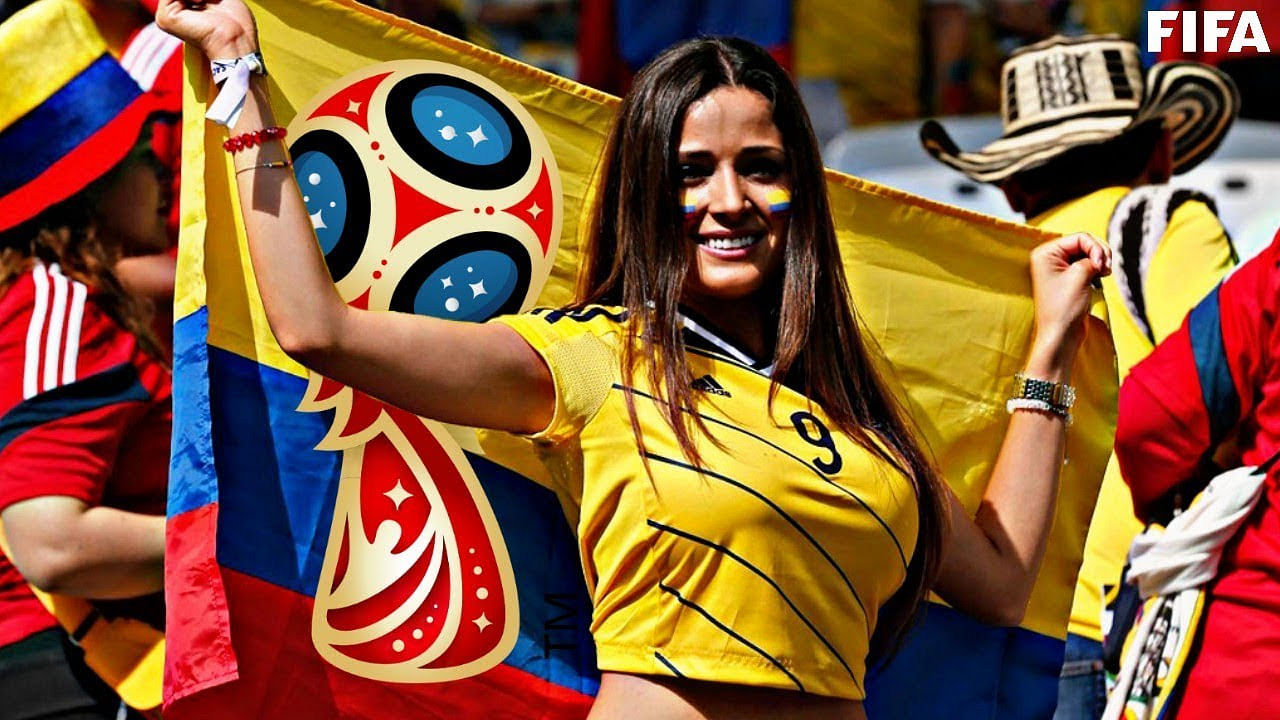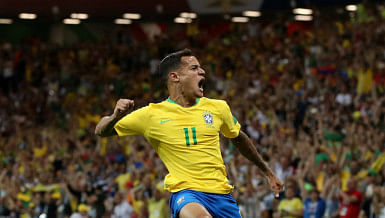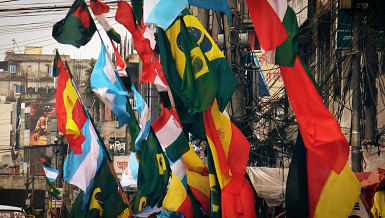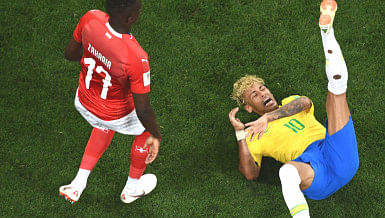FIFA World Cup Russia 2018 (Promo)
The video include Football Skills, Tricks , Highlights , Dribbling & Goals , from Cristiano Ronaldo , Neymar Jr , Lionel Messi , Paul Pogba , James Rodríguez , Luis Suarez and more…

FIFA World Cup Russia 2018 (Promo)
The video include Football Skills, Tricks , Highlights , Dribbling & Goals , from Cristiano Ronaldo , Neymar Jr , Lionel Messi , Paul Pogba , James Rodríguez , Luis Suarez and more…
Football's claim to being the global sport has strong merits. FIFA is an international organisation with more members than the United Nations, and the football World Cup is one of the top two most watched sports events in the world. Even the national leagues in England, Spain, Germany and Italy are enormously popular outside their borders. The chequered football made of sewn black and white pentagons, despite its relatively late adoption in 1970, is recognisable to any child anywhere in the world who has a notion of what sports is. But when you realise that it took 92 years and 22 tries for the first African nation to reach the semi-finals of a FIFA World Cup, it makes you want to examine this "global" sport.
Morocco may as well have been the first non-European and non-South American country in World Cup semi-finals, but that credit goes to a distinct anomaly. USA finished third in 1930, in the first ever football World Cup. In more modern days, it was last done by South Korea in 2002, in their own backyard. Success in the global sport seems to be universal in two continents out of six, leaving others in relative irrelevance. Why is that?
Well, of course, it has everything to do with who came up with the sport and who ran it. Professional football developed in Europe and exploded in South America. FIFA has only ever had European men as presidents, other than the one Brazilian (also a man) who ran it for 24 years. That is concerning, given FIFA's (admirable, on the face of it) policy of allowing every member to have one vote in elections, regardless of footballing prowess or tradition. The Netflix documentary FIFA Uncovered explains how this international governing body for the sport exploited this situation, morphing into a cartel of sorts where power is held onto as long as possible, where votes are bought and sold with money.
This money is most often disbursed to lower ranked teams from poor countries as "development funds." But money ill-begotten is often ill-spent, and seldom do these funds make their way to the grassroots. This process powers a toxic cycle, where poor nations with lower FIFA rankings tend to stay there, while the people representing these nations line their pockets, and FIFA keeps on being corrupt. The European and South American nations with rich footballing traditions generate their own revenue to keep the sport alive and well in their own countries, and it's nigh impossible for anyone else to emerge.
But this doesn't change the fact that football really is the global sport, because it's loved globally. Every country has football fans, if not a proper football league or a national team, and each and every one of those fans dreams of seeing their nation represented on the global stage. Most live and die without ever seeing that dream realised.
But Morocco did it; they found a way, and the way they did it may just be an inspiration, if not a template, for other teams outside of Europe and South America. Morocco's 26-man squad has 14 players born in foreign countries, including some of their best players. Hakim Ziyech and Sofyan Amrabat were born in the Netherlands, Achraf Hakimi in Spain. Defender Roman Saïss and even the coach, Walid Regragui, were born in France. They all have ancestors who were from Morocco, and they chose to play for the North African country. Clearly, they chose well. The Dutch crashed out of the World Cup in the quarter-finals, Morocco knocked out Spain themselves, and now they line up to face France in a semi-final, for a chance to play Argentina in the biggest game of all.
The brand of football Morocco played to get here has had European flavours as well. They have been tactical, nullifying opposition threats, and taking their own chances to score, as opposed to previous African teams who would play exciting football to go out in a blaze of glory. Contrary to Spanish midfielder Rodri's claim that "Morocco offered absolutely nothing," Morocco have actually offered a lot. The tactical know-how of beating technically superior teams is an invention of the Italians of the distant past, or the Portuguese Jose Mourinho in modern times. Morocco applied their own spin on it, based on the players they had and the challenges in front of them, and look at them now!
If you look at FIFA and football administrators at the top, I think their interpretation of why football is the global sport would be that it makes money globally. But if you asked players and fans, I think they would say that it's global because it's played globally, because the truth of football being accessible to anyone with a round thing to kick and a stretch of grass to run on applies to all nations across the world. If that is the case, why should the story of non-European and non-South American success in the World Cup be so limited?
It's clear that Morocco have found their method, their way forward, and football's universality and global appeal – as a sport and not a business – ensures that other nations will too.
Azmin Azran is editor-in-charge of SHOUT, The Daily Star's weekly youth supplement.
Croatia coach Zlatko Dalic stated outright what he felt regarding the controversial penalty call following his side’s 4-2 defeat to France in Sunday’s World Cup final, saying : “You don't give a penalty like that in a World Cup final.”
A debatable penalty awarded with the use of FIFA's new video replay system proved a turning point in the World Cup final on Sunday as debate focused on erronous referee calls.
France and Croatia were level at 1-1 in an evenly contested match when Argentine referee Nestor Pitana was alerted to a possible handball ten minutes from half time and, after checking the off-field screen, he decided Croatia's Ivan Perisic had handled. While there is no doubt that the ball did hit the Croatian’s hand, the focus will remain on whether the handling of the ball was intentional.
Antoine Griezmann converted the penalty and France went on to win 4-2. Even after the use of the Video Assistant Referee (VAR) system, it remained a highly contentious call. Many former players called the awarding of the penalty a dubious decision with former England and Liverpool defender perhaps rightly suggesting that ‘It’s the referee’s mistake, not VAR! VAR is just the replay of an incident.’
The decisions proved to be a turning point in the match as France’s influence grew following their second goal. Dalic said he thought such a decision had no place in a game of such magnitude.
“We played well but the penalty knocked the wind out of us and after that it was very difficult," Dalic said after congratulating France on their victory. "I just want to say one sentence about that penalty: You don't give a penalty like that in a World Cup final.”
The Croatia coach conceded that his team had let in two ‘soft goals’ but lamented the fact that things did not go their way when they were in a good position to fight for the match.
“We wanted to win the World Cup so much, but that's football," he said. "The French did not surprise us; we let in two soft goals coupled with an own goal and a penalty.
“What we had in terms of luck in this tournament, we lacked today. When you concede four goals, you cannot expect to win the game.”
Neverthless, Dalic went on to congratulate France and praised his team’s effort after they gave a vastly talented French side a run for their money.
“I congratulate France on their title. We played well in the first 20 minutes, we controlled the game. Then there was an own goal from a set play. We came back to life, dominated and then the penalty was given,” Dalic said.
“I have to congratulate my players, it was maybe the best game we played in this tournament; we controlled the match but we conceded. Against such a strong side as France you must not make mistakes. We are a bit sad, but we have to be proud as well for what we’ve done.”
Didier Deschamps, France's longest serving national team coach, will not seek to renew his contract which expires in 2026, the French soccer federation (FFF) told Reuters on Tuesday.
Deschamps' deal runs until after the next World Cup, for which Les Bleus have yet to qualify.
The 56-year-old took over from fellow 1998 World Cup winner Laurent Blanc in 2012 and led Les Bleus to the World Cup title in 2018, two years after reaching the European Championship final on home soil.
The former France captain, one of only three people to win football's most prestigious prize as a player and a coach, guided the national team to the World Cup final again in 2022, losing to Argentina on penalties after one of the best matches in the tournament's history.
Earlier on Tuesday, French sports daily L'Equipe reported that Deschamps would make his announcement on Wednesday.
FFF president Philippe Diallo told Reuters Deschamps would not look to extend his stay after the World Cup, adding: "He will go until the end of his contract, i.e. 2026."
Deschamps, who had won trophies with every club he managed before becoming France coach, also claimed the 2021 Nations League title with Les Bleus.
As a player, he won the 1998 World Cup and Euro 2000, both as captain.
A defensive midfielder nicknamed 'the water carrier' by Eric Cantona, Deschamps was a winning machine and under his guidance as coach, France were at times boringly efficient and at others brilliant, beating Argentina 4-3 in the 2018 World Cup round of 16 and Croatia 4-2 in the final.
While Deschamps' side has boasted the thrilling attacking talent of Kylian Mbappe, his teams have also shown grit and unmatched defensive ability when it mattered most.
It is uncertain who will succeed him but Zinedine Zidane is the heavy favourite for the job.
"It's a wise decision. I didn't send anything and I won't send anything (to Zidane). But of course we all hope it will be him after 2026," Christophe Dugarry, a former teammate of both Zidane and Deschamps and one of the latter's most vocal critics, told RMC Radio.
"But it's his choice and it will be linked to discussions with him. But it's a wish that I have, a personal wish that I've had for a long time. I hope it will happen one day. I hope it will be in 2026, from the bottom of my heart."
"The greatest stories are the ones we live in real life." Do you know who said that? It was JRR Tolkien.
I'm kidding guys, I just came up with it. But, you have to admit, I had you thinking that was deep and thought provoking for a second.
But I still think there is something there, because where else would we draw inspiration for our best stories, if not from real life?
In the same way that our life experiences—the highs, the lows and the roadblocks—inspire us to sit down and write our stories, entertainment mediums like wrestling, football, basketball, etc. also have these raw and (sometimes) real storylines playing throughout. In fact, these storylines are what add this extra dimension of intrigue and anticipation that make these games so great to watch.
Sometimes, it's the generic age-old tale of David vs Goliath. Sometimes it's a story of two mortal enemies, destined to battle each other on the grandest stage, till the end of time. A team's history, their players—and their own individual stories—come together to form more layered and complex stories, all of it building up like a movie, until a tournament is finished.
While club football alone has enough stories and drama going on throughout just one season, international football is really where all of the different plot points converge together, forming one compelling narrative.
Think about one of the most memorable international tournaments in recent history, the Euro 2016. Eventual champions Portugal found themselves in an interesting position—at least in retrospect—at the start of the tournament.
In terms of pure skill, their squad probably was not the best one in the tournament. Yes, they probably had the best European player in history as their captain, but they still lagged behind teams like France, Italy and Germany.
Portugal finished third in a group consisting of Hungary, Iceland and Austria—a group they should definitely have topped. However, after three consecutive draws, the last of which involved them coming back from being a goal down thrice, they finished third, earning a place in the knockout stages.
From there on, they would draw themselves to the final, mostly on the back of insane performances from Cristiano Ronaldo and Nani. Going into the finals, they were up against a France team that had topped their group and dominated most of the top teams they had faced on their way to the finals.
After just 25 minutes from the kick-off, Ronaldo found himself injured. Taken off the pitch, the captain who had inspired this team to the final found himself limping along the sideline, watching his team attempt to beat a France team that would go on to win the World Cup just two years later.
Ronaldo cheered his team from the sidelines, shouting and screaming to keep them motivated throughout. Going into extra-time, both teams looked to be struggling for stamina, with Portugal seemingly worse-off than the French.
Somehow, through some moment of magic, where the universe willed Ronaldo's dream of an international trophy into reality, Portugal would score a goal at the 109th minute to take home the trophy.
If we are to talk about the World Cup, rather than the story of a run from start to finish, let's talk about some of the biggest moments, and the backstory to them. Think back to Mario Gotze's late winner against Argentina, in the 2014 World Cup finals.
Throughout the tournament, Gotze only started three out of a possible seven matches. Many times, in the run to the final, Gotze had been criticised for not being up to the mark to start for Germany. His move to Bayern Munich, from rivals Borussia Dortmund, a year back was also a focal point in the discussion for why this man was just another overhyped and overpriced player.
Gotze's 113th minute goal against Argentina will still stand in history as one of the most memorable goals in a World Cup finals. At the same time, it truly is all the legacy a player needs, at least in terms of international competition.
While Gotze might never have lived up to the potential fans had seen of the player in Borussia Dortmund, it is safe to say that this player etched his name in history with a moment that many German fans will remember for the rest of their lives.
This year's World Cup has many interesting stories, whether in the foreground or lurking behind all the goalless draws we have had to watch so far. Possibly the biggest storyline is how this is likely the last ever World Cup where we will see Cristiano Ronaldo and Lionel Messi, two of the greatest players of all time.
Japan's win against Germany, in a hard fought battle to the death, has made us consider if the four time winners will be kicked out in the group stages, similar to their exit in the last World Cup.
Saudi's upset win over Argentina is a story that is building and it will be interesting to see what they do next.
All of these stories, whether in the realm of reality or on the field, play an important factor in shaping how we as humans see both sports and life. These stories inspire us, they give us hope and reaffirm our faith in the idea of the universe having its own plans for us.
So, I would suggest you sit back, relax, and watch the rest of this World Cup play out. See where the story goes. Who takes home the trophy? Which team experiences an upset defeat? Will one of the big European teams get knock-out of the World Cup in just the group stages?
These are all questions that will be answered in time, but watching the story unfold right in front of us is probably the most fun one can have during World Cup season.
Aaqib Hasib is a sub-editor at The Daily Star. Reach him at [email protected].
On Sunday night Griezmann and his team mates produced a pulsating performance before falling to the ground, hugging and sobbing as world champions.
"I do not know where I am," the stunned 27-year-old said while organisers hurried to set up the presentation stage on the pitch. "We cannot wait to lift the Cup and bring it back to France."
While waiting for the presentation Griezmann burst into tears, seemingly as the enormity of his team's achievement swept over him, and while a rainstorm soaked the Luzhniki arena, the player embraced French president Emmanuel Macron who kissed his forehead and clasped his shoulders.
Once the French had their hands on the coveted golden trophy, Griezmann grasped it and ran down to fans behind the goal to show them the World Cup, before skipping back along the side of the pitch holding it aloft.
And when he finally emerged from his on-pitch celebrations the tears had been replaced by a wide smile.
"Frankly I have not yet realised what we have done," he grinned after being named man-of-the-match.
"The World Cup... it's a lot... I am very proud of this team, the players, the coach, the staff. We were really a united group either on the bench or in the line-up. We did something incredible, we wrote history," he said, downplaying his individual role.
But certainly it had been a virtuoso performance by a player of undoubted talent who finally answered his doubters on the game's biggest stage.
He had stayed calm under pressure, unlocked the Croatian defence and been key to victory.
For now, though, he wanted to look forward.
"Now we will party and tomorrow we will party with France and with all the French people," he said, again breaking into an enormous grin.
"It is France we love. (We have) different origins but we are all united. We are many players with different backgrounds, but we have the same goal, we wear the same jersey, we work for each other.






Leave your comments